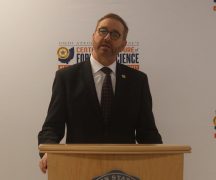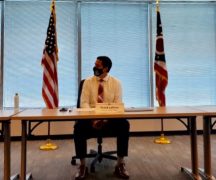FirstEnergy’s CEO and senior vice president “devised and orchestrated” a $64 million bribery scheme to pay a top legislative leader and utility regulator in exchange for official action, according to a sworn declaration Wednesday from shareholders’ lawyers who are suing the company.
While CEO Charles “Chuck” Jones and senior vice president for external affairs Michael Dowling were both suspected central characters in the operation — both were fired after initial FBI arrests in the case and matched identifying details in court documents — Wednesday’s filing marks the first time the two were personally identified.
The company’s shareholders filed a derivative lawsuit, alleging the bribery operation and subsequent legal and political fallout damaged FirstEnergy and violated company policy. Lawyers for the shareholders said the pre-trial exchange of evidence would have shown Jones and Dowling as the engines of the payments.
FirstEnergy as a company entered into a deferred prosecution agreement with the U.S. Department of Justice last summer. In it, the company admitted to a $60 million payment to a nonprofit secretly operated by former GOP Speaker of the House Larry Householder, and another $4.3 million payment to the state’s top utility regulator, Sam Randazzo. However, the company didn’t specify which executives ultimately controlled the payments.
Householder has pleaded not guilty to a charge of racketeering and awaits trial set for January. Two of his alleged co-conspirators have pleaded guilty and await sentencing. Randazzo has not been charged with a crime.
The shareholders’ declaration specifies Jones as “executive 1” and Dowling as “executive 2” in the deferred prosecution agreement. The arrangement calls for FirstEnergy to cooperate with prosecutors, admit to a roughly 40-page statement of facts, and pay a $230 million penalty to possibly avert a criminal charge of wire fraud.
Attorneys representing Jones and Dowling did not respond to emails Wednesday.
“While we can’t comment on the court filing today, FirstEnergy continues to take steps to rebuild trust with stakeholders and position the company for the future,” said company spokeswoman Jennifer Young. “This includes, among other proactive steps, strengthening the leadership team, enhancing its compliance program, implementing more robust oversight of government affairs engagement, and resolving multiple regulatory proceedings.” READ MORE
Ohio primary date debate continues: GOP asks for dismissal of map lawsuit
BY SUSAN TEBBEN
The debate over a court’s role in changing the primary date continues in responses submitted to the Ohio Supreme Court.
Senate President Matt Huffman and House Speaker Bob Cupp flatly rejected the idea of a primary date change by the supreme court, and advised the court to “deny this baseless motion.”
The motion came from House Minority Leader Allison Russo and state Sen. Vernon Sykes, who tucked the request to change the primary date to June 28 into lawsuits against legislative redistricting in the state.
Russo and Sykes asked the court to move the primary date to allow the Ohio Redistricting Commission to conduct their work on the fourth attempt at Statehouse district maps without impeding the election process.
Russo, Sykes serve as the Democratic members of the Ohio Redistricting Commission, while Huffman and Cupp join Secretary of State Frank LaRose, Auditor Keith Faber and Gov. Mike DeWine as Republican members.
But Huffman and Cupp said the Democrats request would require the court to violate the Ohio Revised Code and “separation of powers principles inherent” in the constitution.
“The Court already recognized that it is the general assembly, not this court, which has the exclusive authority to set the election date and related deadlines,” the two wrote in court documents.
A federal elections clause does dictate that legislatures determine the “time, place and manner” of elections across the country, but Russo and Sykes argued the court had authority in this specific case because of the impact redistricting is having directly on the primary, currently scheduled for May 3. READ MORE
‘Ohio is strong.’ DeWine emphasizes mental health, avoids controversy at State of the State
After two years of wracked by a deadly pandemic and nationwide political turbulence, GOP Gov. Mike DeWine delivered a “State of the State” address aimed to force a political system to steadier times.
Addressing the legislature, justices on the Supreme Court, ranking state officials, and the state at large, DeWine avoided heated political issues and focused on expanding access to mental health care, funding state parks and Appalachian counties, strengthening distracted driving laws, and adding new criminal penalties to convicted criminals found in possession of a weapon.
The lighter fare of the speech (the House Speaker later described it as “uplifting”) stands in contrast to an acrimonious political moment.
He addressed a Republican legislature that last year overrode his veto and stripped the governor’s office of key powers to respond to pandemics; seated in the crowd were Ohio Supreme Court justices, some of whom have recently overturned four legislative and congressional redistricting proposals as partisan gerrymanders that DeWine supported; last week, DeWine signed controversial legislation removing training and permitting requirements to carry a concealed weapon. The speech comes after a pandemic that — besides killing nearly 38,000 Ohioans and hospitalizing 114,000 — nixed the past two annual State of the State addresses.
Wednesday’s speech, however, painted a rosier picture of state affairs. His plugs ranged from Intel, which is investing billions in the state to build two massive factories building semi-conductor chips, to the Cincinnati Bengals making it to (though losing) the Super Bowl.
“The state of our amazing state is strong. Ohio is strong,” he said. “What unites us is much stronger than what divides us.” READ MORE





